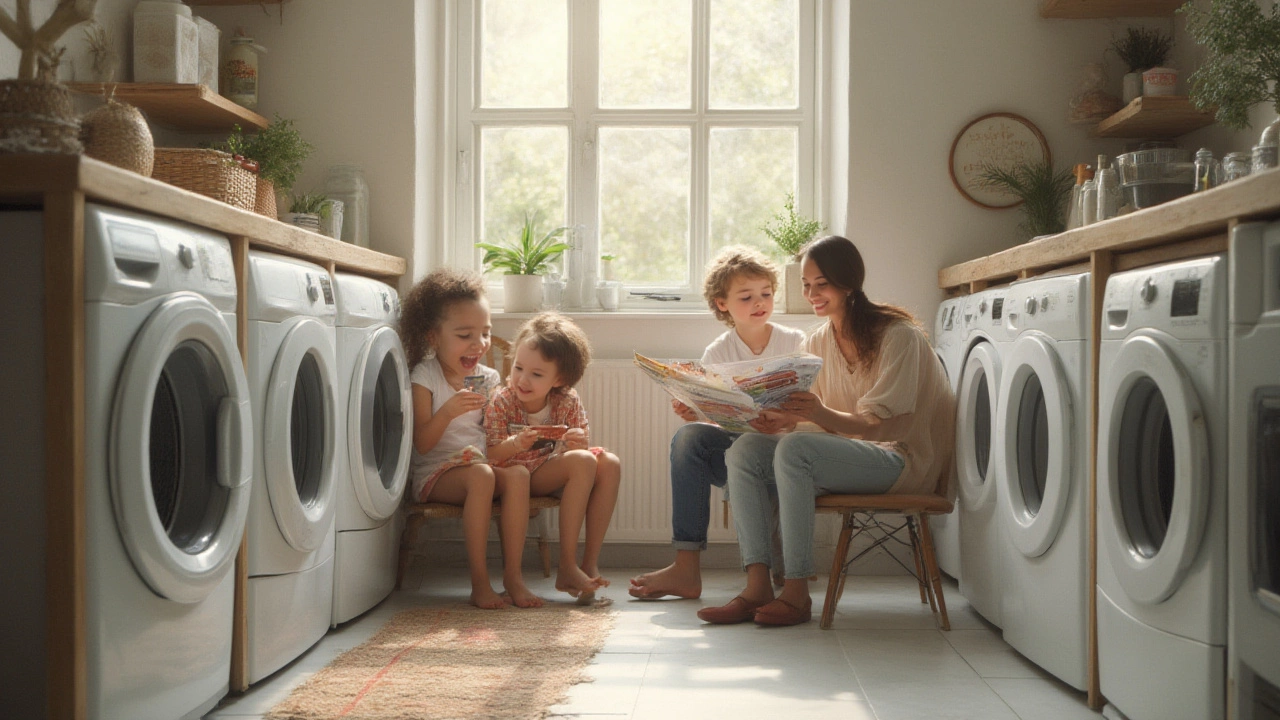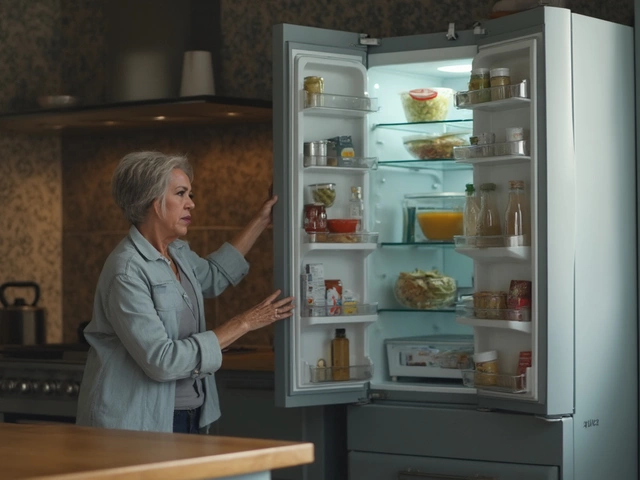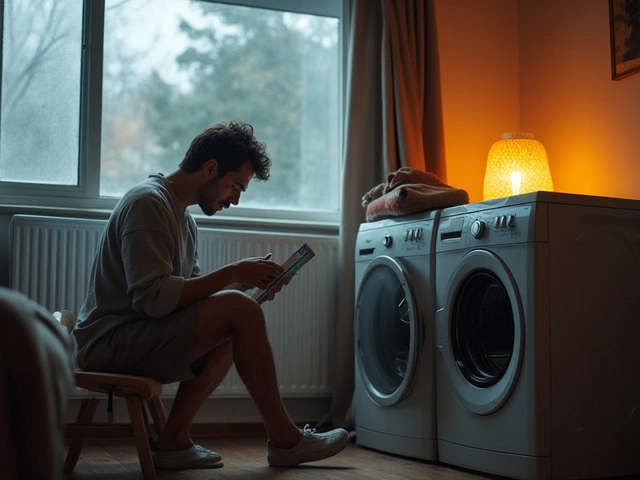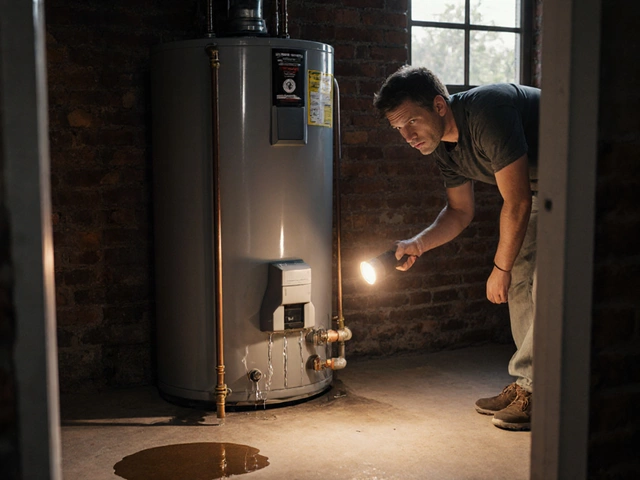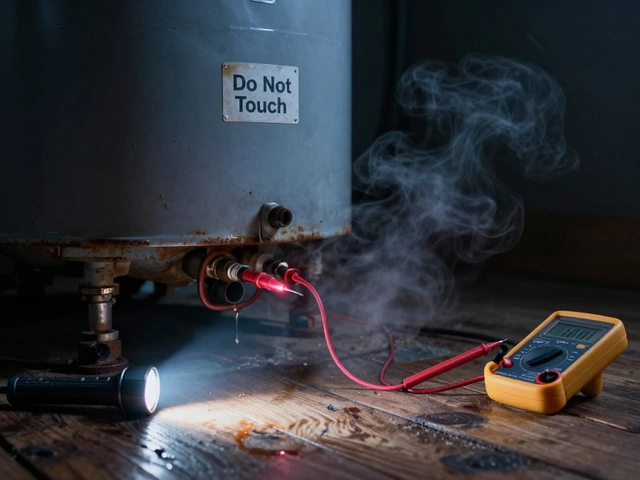How many hours have you lost waiting for a stubborn washing machine to decide it's ready to spin? My dog Charlie's thumping tail beats out my frustration whenever laundry day turns south thanks to a clunky washer. The truth: picking a washing machine is more than just choosing something shiny—it’s about dodging those repeat headaches when your family’s socks come out still dirty. There’s data, sure—but real stories from repair techs and owners (like me, who once wrestled with a lemon of a front-loader) tell you brands are not all created equal. Some washers just don’t give up, while others seem to break the day after payday. So, let’s get into which washing machine brands are actually known for the least problems—no sugarcoating, just the facts you’d want if Luna and Charlie were tracking mud across your only clean shirt.
How Washer Reliability Gets Measured: What Counts as a Problem?
Folks throw around claims about “reliability” all the time, but what’s really behind those stats? Most big surveys, like the 2024 Appliance Reliability Study from Yale Appliance or actual consumer reviews on product pages, treat a problem as anything that requires a service call or a repair beyond just clearing a sock from the drain. That includes breakdowns, leaks, control board failures, even nagging door lock issues that keep you locked out of your weekend plans. Usually, these studies tally up what percent of buyers needed service in the first few years—key for people who don’t want to see a repair bill the first time they wash their dog’s bedding.
More than just numbers, reliability depends on hidden details: the motor type, how complex the electronics are, even where the washer is made. I’ll give you an example: brands with simple dial controls often break down way less than models packed with touchscreens, because there are just fewer things to fail. That’s why many repair techs roll their eyes at “smart” washers after seeing all the error codes that pop up with a WiFi glitch.
You’ve also got to be careful with warranty data—it can look great if a brand offers a long warranty, until you realize most real-world problems get reported after that first-year coverage runs out. That’s the sly catch with some budget brands. The real test is what happens after 18 months or two busy years—does the machine still sound normal? Does it leak from the front, like that one Samsung model that nearly drowned my kitchen floor in 2023? People like you and I care less about manufacturer promises and more about how many users end up posting in Facebook groups “Help, my washer just died and the laundry’s eating my Saturday.”
Another insight: not all fails are equal. Some washers keep running with small quirks while others knock out their control boards and stop dead. Have you noticed most horror stories come from front-loaders with fancy features, especially in big families with muddy kids or pet fur everywhere? Small homes with light laundry habits often barely notice the issues that drive bigger households nuts.
Bottom line, reliable means less time fixing, fewer days spent lugging wet clothes to a neighbor’s machine, and real confidence that you’re not facing a costly repair every other year. So when shops or blogs rank “reliable brands”, they’re counting every headache—major motor failures down to broken knobs.
And for the record, people forget to mention geography. Repairs in busy cities get fixed faster (if you can find a tech!), but rural owners might be stuck for weeks because their brand isn’t supported. That’s a practical kind of problem that never shows up in glossy brand rankings but really matters for your sanity.
Brand-by-Brand Breakdown: Which Washing Machines Break Least?
Let’s get straight to it—here’s what people who live with their washers (and the techs who fix them) say about the leading brands:
- Speed Queen – It’s almost cliché to mention them, but there’s a reason American laundromats choose Speed Queen: their commercial-style top-loaders are like the Labrador Retrievers of washers—sturdy, simple, and a bit old-school. Yale’s 2024 report shows Speed Queen top-loaders had service rates under 7%, the lowest in their class. Their machines don’t have a ton of bells and whistles, but owners go years without a real issue beyond the odd loose screw. My neighbor runs a Speed Queen, and his washer outlived his previous two cars. Downside? They can cost more up front and the design looks straight out of a retro sitcom. But you’re not paying for looks; you’re buying peace of mind.
- LG – This is the top pick if you want a high-efficiency front-loader with the least complaints. Across thousands of reviews (think Home Depot, Amazon, and Reddit), LG has the lowest call-out rates of any front-load brand, hovering around 10% at the three-year mark—even beating out Samsung and Whirlpool, which fall closer to 15%. LG’s direct-drive motors are a big reason: fewer moving parts inside mean less that can snap or grind itself to death. If you hate repairs, look for LG models with fewer fancy cycles. Simple models almost never show the dreaded "LE" or "OE" codes that make group chats blow up.
- Whirlpool/Maytag – These two are really the same under the hood, and you’ll see them praised for their reliability, especially in classic top-loading models. Maytag, especially, is a favorite for buyers who need to hammer out piles of laundry every week. The newer Whirlpool “4.5 Cu. Ft.” models don’t break as often as consumer-grade Samsungs or GE washers, with service rates near 12% in key surveys. My cousin runs a cleaning business and swaps out washers every decade—Whirpool has lasted her the longest without a critical fail. The tricky bit: avoid their very cheapest (or “High Efficiency” top loads) as those have more sensor problems.
- GE – General Electric has gotten stronger since 2020 but still trails behind LG or Speed Queen in owner satisfaction. Their top-loaders, especially, are okay but tend to have issues with lid locks and water sensors within a few years. Surveys peg their repair rates closer to 16% at three years, but they’re far from the disaster stories seen with some European knockoffs.
- Samsung – Mixed bag here. Some Samsung owners swear their washers are tanks, but repair data and forums tell a spikier story. Mid- and high-end Samsungs are more likely to run into control board or water pump problems just after warranty, especially the fancier WiFi ones. Despite all the features, they show about a 15-18% service rate by year three, and parts can be expensive if things go wrong.
Let’s not forget, there are lesser-known brands—Electrolux, Bosch, Haier—but their availability and repair networks in the US or UK aren’t as strong. Bosch front-loaders, for example, are loved in Europe but finding a tech to fix an error code here can eat a whole week of your life.
One pattern that’s come up over and over: top-loaders (think Speed Queen, Maytag, Whirlpool) have half as many repair calls as front-loaders with fancier controls. That’s not just nostalgia: it’s the wiring, belts, and sensors. Less complexity equals fewer headaches. If your home is rough on machines, seriously consider buying the plainest thing that fits your laundry room.
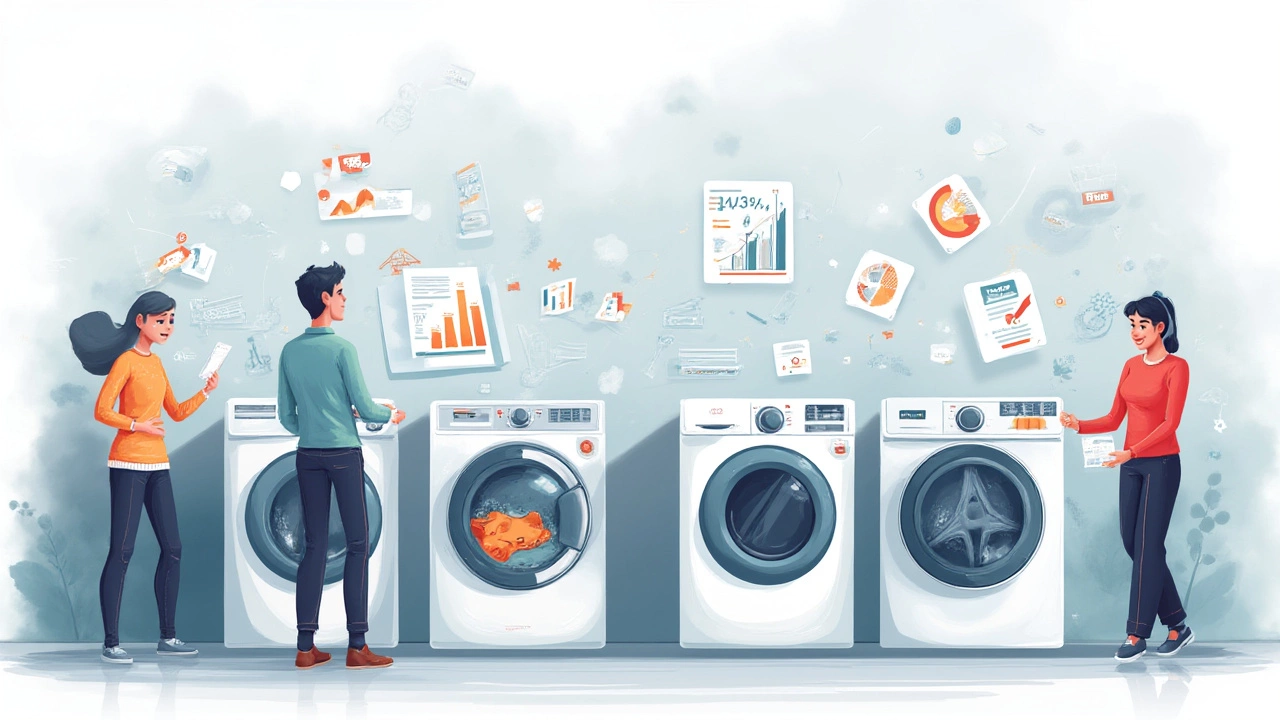
Why Do Washers Break? Most Common Issues by Brand
The weirdest thing about modern washers is that the fancier features—extra rinse cycles, automatic dispensers—often cause the most grief. Most problems boil down to a handful of culprits:
- Electronic controls – Touchscreens and fancy sensors are more likely to glitch or die early, especially when kids play with the buttons or pets nudge the controls (Charlie once started a cycle with his nose—no joke). LG and Samsung seem to do better here than GE and Whirlpool, but they’re not immune if there’s a surge.
- Drainage problems – Blocked pumps or filters are a headache in nearly every brand. If you have pets like Luna shedding everywhere, keep a close eye on front-loader filters, which love to grab fur and turn it into a wall of muck. LG and Whirlpool have the least trouble, as their pumps are designed for easier clearing, but it’s still a universal issue.
- Leaking doors or gaskets – This is the front-loader nightmare. Samsung and GE front-loaders get roasted in reviews for leaky doors after a year or two. Speed Queen and Whirlpool top-loaders don’t have this flaw at all.
- Broken lid locks and latches – GE and Maytag are not immune, but Whirlpool designs tend to have tougher locks. If you slam the lid often (or if your kids do parkour in the laundry room), expect trouble sooner or later.
- Motor and belt failures – Classic Maytag and Whirlpool have overbuilt motors, making this extremely rare, while early LG washers (pre-2015) sometimes suffered from motor board faults. These days, direct-drive LG motors are about as reliable as you’ll find for a home washer.
Common sense goes a long way—run full loads, don’t overload, and keep the drum clean. A simple monthly wipe of the door seals can save a year of trouble, especially with cats who treat the washer as a nap spot. Oddly, the more advanced the washer, the more basic the root of the problem: lint, coins, buttons, and pet hair cause more calls than worn-out parts. (And yes, your brand-new athletic socks are secretly plotting to jam the drain filter.)
Brands try to stand out with more technology, but the real test is how the basics hold up: How long does a normal wash cycle take after a couple of years? Do the old-school mechanical parts still click into place? Is finding a replacement pump or belt easy and affordable? Repair pros line up to praise the brands that keep those simple—the ones you can actually fix without a computer science degree.
After talking to multiple repair techs and friends who do laundry for big families (or, in my case, have mountains of muddy dog towels), I can tell you—washer reliability isn’t magic. It’s all about build quality, not fluff. Simple models last longer, and brands that don’t change their designs every year (looking at you, Samsung) are less likely to drop a weird new fault on unsuspecting users.
Tips Before Buying: Picking the Most Reliable Washer for You
If you’d rather be playing fetch with your dog than waiting on hold for a repairman, the secret is choosing a washer that fits your laundry style. Here’s what I’d tell a good friend:
- Match the brand to your habits. If your household does big family loads or has messy pets, skip delicate controls—go for Speed Queen, Maytag, or classic Whirlpool. For tech lovers who want a quiet, energy-smart machine, LG’s front-loaders win out.
- Simplicity equals fewer breakdowns. Buttons and knobs still beat out touchscreens for long-term durability. The latest study from Yale Appliance shows knob-controlled washers last up to 3 years longer before their first repair call compared to touch models.
- Don’t chase extreme capacity. The biggest drums are tempting, but they strain motors and bearings much harder. Stick to average sizes unless you’re washing for a small army. Warranty data shows most super-capacity washers see a repair 16 months sooner than average ones.
- Check parts and repair support. If you live far from a city, make sure your brand has local techs and easy parts access. LG, Whirlpool, and Maytag are everywhere. Speed Queen is best supported in North America, less so in Europe or Asia.
- Use owner forums. Real-world owners spot quirks long before reviews catch up. Sites like Reddit’s r/appliances are gold mines for little-known issues (like a GE washer model that’s allergic to hard water, or a Samsung pump that whines when dogs shed too much).
- Keep receipts and register the appliance online. Almost half of warranty claims get denied because owners didn’t register or lost paperwork. Take a photo and stash it on your phone—it saves frustration if something does go wrong in that first year.
- Optional: skip “smart home” or WiFi versions. Unless you genuinely love managing your laundry from an app, these features tend to offer more headaches than help. When the WiFi fails, it can lock some models out of their normal wash cycles (Samsung, ahem, looking at you).
And something I learned after Charlie munched a control knob (and Luna tried to nap inside a front loader): safety latches and tough controls matter more than you’d think if you have energetic pets or kids.
It’s easy to get wowed by futuristic features, but almost every washer owner I know who spends more time living than fixing things opts for a basic, well-reviewed model from a brand that’s been around a few decades. Want fewer issues? See if a local laundry service or small hotel runs the brand you’re considering—they replace washers only when they die for good, and they know what lasts.
Long story short: for least problems with minimal fuss, Speed Queen for top-load, LG for modern front-load, and ya can’t go wrong with Whirlpool or Maytag for hard-wearing reliability. Just remember—what you really want isn’t to show off a high-tech washer, but to forget you even own one as it churns away without drama.
